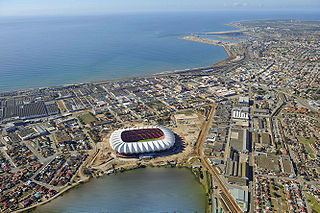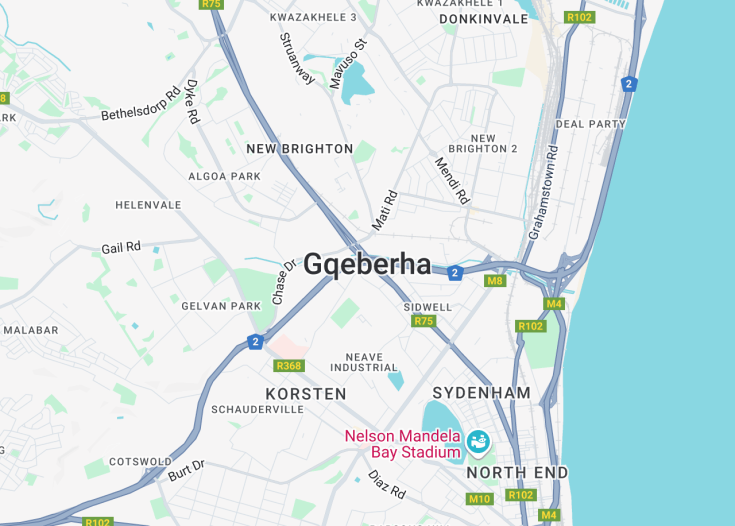Gqeberha, formerly known as Port Elizabeth, is a vibrant city located in the Eastern Cape of South Africa. Renowned for its beautiful beaches, historic attractions, and rich cultural heritage, this city offers a unique blend of modern urban life and indulgent relaxation.
Visitors can explore the revitalized harbor area, indulge in water sports, or discover the local arts scene. Gqeberha serves as an ideal gateway to the Garden Route and the wildlife reserves in the Eastern Cape.
Make sure to visit the Donkin Reserve for panoramic views of the city and to experience its iconic stone pyramid and lighthouse.
Plan your visit during the summer months from December to February when the weather is ideal for beach activities and outdoor exploration.
Gqeberha (Port Elizabeth): A Vibrant South African Gem
| Country | South Africa |
| Time in Gqeberha (Port Elizabeth) | GMT+2 |
| Language spoken | English |
| Population | 968,000 (Statistics South Africa, 2021) |
| Currency | South African Rand (ZAR ₡) |
| Airports |
|
Gqeberha, formerly known as Port Elizabeth, is a bustling port city located on the southern coast of South Africa, and is part of the Eastern Cape Province. It is often referred to as “The Friendly City” or “The Windy City”, and is known for its many beautiful beaches and rich history. Forming part of the Nelson Mandela Bay Metro, which includes neighboring cities like Uitenhage and Despatch, Gqeberha serves as a major economic hub, boasting one of the largest seaports in South Africa.
The city’s history dates back to 1820 when British settlers made a significant mark on its development. Today, Gqeberha is celebrated for its vibrant multi-cultural atmosphere and various heritage sites, including the Campanile Memorial and several museums that reflect its complex past. It is also a gateway to the stunning Eastern Cape hinterlands and the world-renowned Garden Route, making it a favorite for both water sports enthusiasts and wildlife adventurers.
Alongside its economic contributions from the motor vehicle industry, the city is also a center for arts and culture, with several theaters, galleries, and music venues. It boasts one of the country’s most competitive education systems, featuring leading schools and universities, including Nelson Mandela University.
Nature lovers revere Gqeberha for its well-protected nature reserves, some of which are involved in global biodiversity projects. Nearby, Addo Elephant National Park offers sightings of the Big Five, especially elephants, often a major draw for tourists. Furthermore, the city’s climate contributes to a lifestyle that promotes outdoor activities throughout the year, hosting events such as the Ironman Triathlon, which draws international participants and spectators.
Where is Gqeberha (Port Elizabeth)?
Gqeberha is located on the southern coast of South Africa, at the western end of Algoa Bay, adjacent to the Indian Ocean.
Distances:
| Route | Distance by car | Time by car |
|---|---|---|
| Johannesburg to Gqeberha | 663 mi | 10 hrs 30 min |
| Cape Town to Gqeberha | 468 mi | 8 hrs |
| Durban to Gqeberha | 497 mi | 8 hrs 40 min |
What is Gqeberha (Port Elizabeth) famous for?
Gqeberha is renowned for its stunning coastal beaches, historic landmarks, and as the host city of the annual Ironman Triathlon. Its rich cultural heritage and vibrant local community make it one of South Africa’s most popular destinations.
History
Pre-1800s: Indigenous Settlement
Long before European settlers set foot on this region, the area now known as Gqeberha was inhabited by the Khoi and the San people, amongst other indigenous groups. These communities thrived through hunting, gathering, and fishing along the rich coastal waters. The biodiversity of the area supported a sustainable way of life for its original inhabitants, which continued until the arrival of European colonizers.
1820: British Settlement and Development
The area began to transform significantly in 1820 when the British settled here, establishing a town and naming it Port Elizabeth in honor of the wife of the Cape Colony’s governor, Sir Rufane Donkin. The port thrived due to its strategic location, serving as a major transit point for trade between Europe and the hinterlands. The arrival of British settlers significantly shaped the socio-economic and cultural landscape of the region, leading to rapid development and modernization of the area.
20th Century: Industrial Growth and Apartheid
Throughout the 20th century, Gqeberha evolved into an important industrial center, especially due to its thriving automotive industry. However, this period was also marked by the distressing effects of apartheid, which enforced racial segregation and deeply affected the economic and social structures of the city. Significant political and social unrest characterized this era, culminating in the city playing a notable role in the struggle against apartheid.
Post-1994: Renaissance and Renaming
Following the end of apartheid in 1994, Port Elizabeth experienced a renaissance of sorts, marked by economic recovery and cultural revitalization. The city was officially renamed Gqeberha in February 2021, reflecting a return to indigenous heritage and a step towards decolonization of public spaces. Today, Gqeberha stands as a symbol of resilience and renewal, boasting a rich history and vibrant multicultural community.
Visit Gqeberha (Port Elizabeth)
What to see and do in Gqeberha (Port Elizabeth), South Africa
Explore the natural beauty and cultural heritage of Gqeberha. Visit the Donkin Reserve, a historical monument and park offering expansive city views. Walk through the vibrant streets, witness the blend of colonial and modern architecture, or explore the local art galleries showcasing South African art.
- Boardwalk: Stroll along the scenic ocean boardwalk, a favorite for locals and tourists.
- Beaches: Spend a day at King’s Beach or Humewood Beach for sunbathing and water sports.
- Addo Elephant National Park: A short drive from the city, this park offers fantastic wildlife viewing, home to the densest elephant population in the world.
Events and Festivals
Gqeberha hosts several annual events that celebrate its rich heritage and vibrant culture. Notable among these is the Nelson Mandela Bay Jazz Festival held in March, drawing jazz enthusiasts globally.
The Splash Festival in April offers water sports, live music, and beach games, ideal for families and thrill-seekers alike.
Best time to visit Gqeberha
The best time to visit Gqeberha is during the spring (August to October) and autumn (February to April) months when the weather is most pleasant—temperatures are mild, and the city is less crowded.
This period is perfect for outdoor activities and exploring the city’s beaches and wildlife.
Is Gqeberha worth visiting?
Indeed, Gqeberha is worth visiting for its unique blend of cultural history, vibrant urban life, and stunning natural landscapes. From its rich history encapsulated in its museums and monuments to its beautiful beaches and exciting wildlife parks, there is something for everyone.
Whether you’re a history buff, adventure seeker, or beach lover, Gqeberha offers a compelling array of attractions and experiences that make it a must-visit destination in South Africa.









